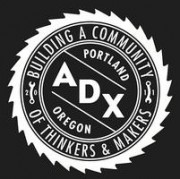Portland Made: A Focus on Local Fashion
Monday, May 25, 2015

Two companies that are committed to bringing textile manufacturing back to Portland are local production manufacturers Portland Garment Factory and Spooltown, and they cannot keep up with demand. As a result, local designers are finding it almost impossible to produce their work locally. In fact, the demand is increasing so rapidly that there is a call within in the industry to create a fashion incubator, similar to what ADX does for craft goods: a place where fashion designers can share tools, volume order materials, share professional development resources and work together to help each other be successful. An incubator like this could include a contract small run production team and an associated workforce training program that could help grow the local fashion industry, enabling it to compete with other cities in the US. The challenges are numerous, but an impassioned group of local designers and determined industry leaders are trying to make it happen.
Portland Made contributing writer, Peggy Acott sat down with Marjorie Skinner, Portland Mercury Managing Editor and author of the weekly column on local fashion and retail "Sold Out."
Marjorie has been studying the indie fashion scene in Portland for more than a decade. She has followed and reported on the progress and maturation of this segment of the Portland Maker Movement. She says she has definitely seen some changes in that time; not so much in the number of indie designers, but in how they approach their work.
“Ten years ago people were experimenting at making a living,” says Skinner. Fashion designers typically came from an arts and craft, fine arts or self-taught background; their experience was heavy on the artistic and creative aspects of the profession, less so on the business end of things. But over time designers grew more determined to transform what they had considered strictly a “fun, creative venture,” into an economically viable and competitive career. “The conversation got more sophisticated,” Skinner observed, and designers started to identify where they wanted to go and what they needed to get there. She sees this change particularly in the designers’ approach to business and marketing, which is becoming “more savvy, more clean, more professional.” This new focus has resulted in a marked increase in the overall quality of clothing design and production.
In the early days, designers relied exclusively on a network of home sewers for the production of their garments and accessories. Designers kept their sewers a closely guarded secret to preserve their availability in the face of growing demand. Many designers used Etsy as their main portal for sales, and required only small batches of a few designs. Because the minimum production requirements of large manufacturers were greater than these small makers needed to produce, they were unable to work with them.
Correctly seeing the need for a “middle ground” scale of production, Portland Garment Factory opened in 2008. The home sewers still had (and do to this day) plenty of work with small batch production and one-of-a-kind specialty-tailored garments,but Portland Garment Factory provided an important stepping stone for indie designers who want to increase the availability of their product lines.
For the fashion industry as a whole, the challenge for the future will continue to be one of availability of adequate means of production: Manufacturing in this industry is facing the same challenges as other realms, in that a large number of the workforce is at or nearing retirement age, and there aren’t enough young workers training to take their place. Companies like Portland Garment Factory and Spooltown are playing a vital role by enabling designers to continue to have their garments and accessories made here in Portland.
In the following weeks we will take a look at Portland's fashion sector from a number of different perspectives and try to better understand what it will take to support all of the incredibly talented designers based here.
_________________________

Kelley Roy is the founder of ADX, a 14,000 square foot Makerspace where artists and designers work along side each other to prototype and launch new product lines. ADX is also open to the general public and teaches people of all ages how to make. And if you don't want to do it yourself, you can hire ADX to make it for you. For more information check out adxportland.com.
Portland Made is a digital storytelling platform and advocacy center for Portland's Maker Movement. We do 2 features a month on Portland Makers; connect makers with more local, national and international markets; connect makers with local professional and manufacturing resources; advocate for makers with politicians at all levels of government; work with PSU on an annual survey that captures the economic power of the Maker Movement; help makers find real estate; and promote Portland makers with local and national media.

Related Articles
- Portland Made: Straight Razor Maker Scott Miyako
- Portland Made: Woodworker Josh Mabry
- Portland Made: Working Together ADX + Togetherfarm
- Portland Made: Zenger Farms, Growing the Next Generation of Farmers
- Portland Made: Product Innovator, Sam Pardue of Indow
- Portland Made: Oregon Kombucha Starter Kit
- Portland Made: Kim Malek of Salt and Straw
- Portland Made: Lamp Designer Shannon Guirl
- Portland Made: Leather Craftsman Geoff Franklin
- Portland Made: Food Incubator, Kitchen Cru




 Delivered Free Every
Delivered Free Every
Follow us on Pinterest Google + Facebook Twitter See It Read It